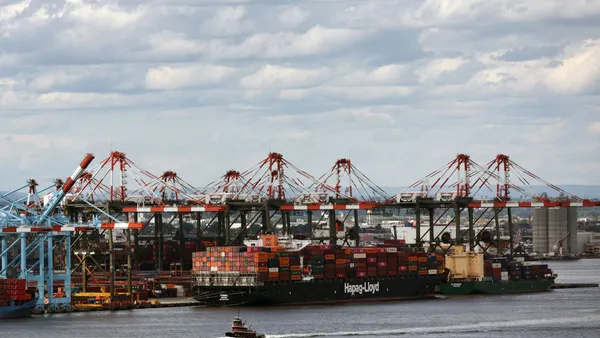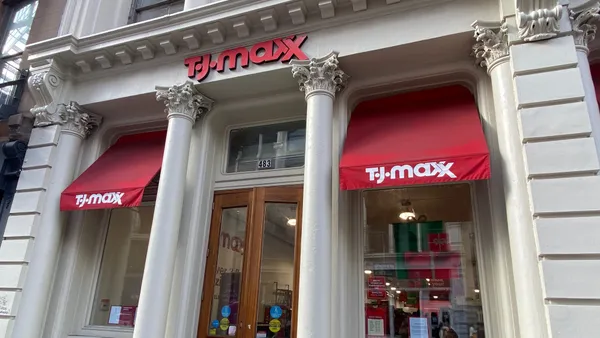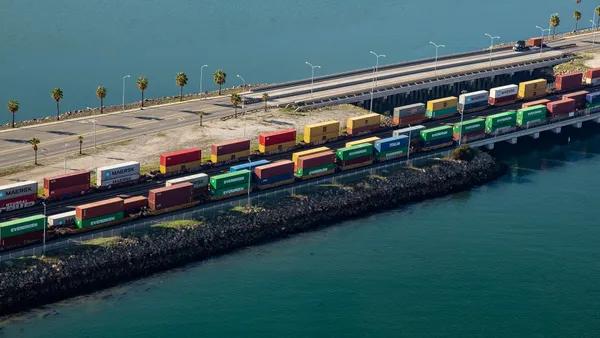Dive Brief:
- Early estimates for March U.S. port volume show it declined to its lowest level in the last five years and throughput is expected to stay depressed through early summer, according to the National Retail Federation and Hackett Associates.
- The Port of Long Beach saw a 5% decline in volume last month that it blamed on 19 blank sailings during the first quarter of 2020, which led to a 6.9% drop in cargo shipments. The Port of Los Angeles saw imports fall 26% YoY, which the port said was the "lowest amount of monthly cargo moving through the Port since February 2009," according to a press release.
- Some experts had expected a quick recovery in import volume after Chinese factories started to come back online, but this hasn't been the case as the coronavirus pandemic has resulted in wide-spread social distancing measures that have hit the American economy. "We are seeing far fewer imports coming into the United States than previously expected," NRF Vice President for Supply Chain and Customs Policy Jonathan Gold said in a statement. "Many stores are closed, and consumer demand has been impacted with millions of Americans out of work."
Dive Insight:
As the coronavirus forces retailers to close storefronts and factories to turn off production lines, they are suddenly not looking to import items from foreign suppliers to keep their sites operational.
"We are hearing that retailers are canceling orders so as not to end up with inventory they can’t sell with stores closed or lower consumer demand," J. Craig Shearman, the vice president for government affairs public relations at NRF, told Supply Chain Dive in an email.
Ocean carriers are left scrambling to cut capacity to match reduced demand. In the last week, the number of blank sailings jumped from 45 to 212, according to the latest figures from Sea-Intelligence. Even the best-case scenario it presented has ocean carrier profits declining by $6 billion year-over-year in 2020 on a 10% drop in volume. For carriers, the worst case would be if the decline in demand and blank sailings also resulted in falling rates.
"It is therefore clear that the primary purpose of the capacity reductions should be seen as an effort to prevent a catastrophic drop in rate levels," Sea-Intelligence CEO Alan Murphy said in a release emailed to Supply Chain Dive. "The cost savings are also important, as they too are measured in the billions, but pale in comparison to the impact declining rate levels will have."
So far, rates have not been an issue for maritime carriers, however. Lofty air fright rates have resulted in shippers looking for alternative modes of transportation, which has helped to buoy ocean rates, according to a Freightos release emailed to Supply Chain Dive.
As carriers issue blank sailings, shippers will need to keep the impact on lead times in mind and "select sailings based on the latest data on the incidence of cancellations by alliance and by week," according to Drewry.
The next challenge for ports will be figuring out how to handle an incoming uptick of imports that took off from Asia after factories got back to work, but before the economy elsewhere began to tumble.
"As Chinese factories reopen, there are concerns that backlogs at ports could become a problem if already-ordered merchandise shows up and retailers aren’t able to pull the cargo because their stores or distribution centers are closed," Shearman said. "We have made it clear that distribution centers are essential because incoming cargo has to have someplace to go."
As new imports are headed for ports, empty containers have piled up in yards as a result of the canceled sailings that would normally transport empties to international suppliers to be used.
"The problem is if you have containers stuck in your yard and you can't get them back and then all of a sudden you get a whole a rush on imports coming in, now you're kind of squeezed on both ends," Weston LaBar, the CEO of the Harbor Trucking Association, told Supply Chain Dive in an interview last week.
Ports have been working with rail companies and ocean carriers to evacuate empty containers, he said.
The Federal Maritime Commission (FMC) has created new "Supply Chain Innovation Teams" to help address some of the cargo challenges that have arisen as a result of the pandemic. The teams began their work this week, the agency announced on Monday.
This story has been updated to include March numbers from The Port of Los Angeles.














